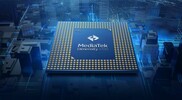MediaTek Dimensity 8050 vs MediaTek Dimensity 8020
MediaTek Dimensity 8050
► remove from comparison
Der MediaTek Dimensity 8050 ist ein ARM-basiertes SoC (System-on-a-Chip), welches bei TSMC im 6-nm-Prozess gefertigt wird. Es unterstützt alle aktuellen Mobilfunkstandards inklusive Dual-SIM-5G (5G SA & NSA, max 4.7 Gbps Download und 2.5 Gbps Upload). Außerdem unterstützt das SoC Wi-Fi 6 und Bluetooth 5.2.
Der MediaTek Dimensity 8050 wurde speziell für den Einsatz in Android-Smartphones entworfen und sortiert sich leistungstechnisch in die obere Mittelklasse ein.
Der CPU-Teil besteht aus drei Clustern: Einem schnellen Performance-Kern, basierend auf der ARM-Cortex-A78-Architektur und getaktet mit bis zu 3 GHz. Der zweite Cluster besteht aus drei Cortex-A78-Kernen mit bis zu 2,6 GHz. Als Stromspar-Cluster sind vier ARM Cortex-A55 Kerne mit bis zu 2 GHz verbaut. Die integrierte Grafikeinheit ARM Mali-G77 MC9 kann Displays mit einer Auflösung von bis zu 2.560 x 1.080 und einer Bildwiederholrate von bis zu 144 Hz befeuern (ev. nur bei Full HD+).
Technisch ist das SoC ähnlich zum älteren Dimensity 1300.
MediaTek Dimensity 8020
► remove from comparison
Der MediaTek Dimensity 8020 ist ein ARM-basiertes SoC (System-on-a-Chip), welches bei TSMC im 6-nm-Prozess gefertigt wird. Es wurde speziell für den Einsatz in Android-Smartphones entworfen und sortiert sich leistungstechnisch in die Mittelklasse ein. Es unterstützt alle aktuellen Mobilfunkstandards, inklusive 5G mit 2CC-CA (200MHz) und FDD+TDD.
Technisch ist der Dimensity 8020 ähnlich zum älteren Dimensity 1100.
Die CPU arbeitet insgesamt mit acht Kernen, welche sich in zwei Cluster unterteilen. Der eine besitzt vier ARM Cortex-A78-Leistungskerne mit jeweils bis zu 2,6 GHz, der andere vier ARM Cortex-A55-Energiesparkerne mit jeweils bis zu 2,0 GHz. Als Arbeitsspeicher kann LPDDR4-RAM verwendet werden, als interner Speicher wird UFS 3.1 unterstützt.
In puncto Konnektivität steht Dual-5G zur Verfügung, außerdem Wi-Fi 6 und Bluetooth 5.2.
Die integrierte Grafikeinheit ARM Mali-G77 MC9 kann Displays mit einer Auflösung von bis zu 2.560 x 1.080 und einer Bildwiederholrate von bis zu 144 Hz befeuern (ev. nur bei Full HD+).
Der Chip wird im aktuellen 6nm Prozess (Mid-Range) bei TSMC hergestellt.
| Model | MediaTek Dimensity 8050 | MediaTek Dimensity 8020 |
| Codename | Cortex-A78 / A55 | Cortex-A78 / A55 |
| Clock | 2000 - 3000 MHz | 2000 - 2600 MHz |
| Cores / Threads | 8 / 8 1 x 3.0 GHz ARM Cortex-A78 3 x 2.6 GHz ARM Cortex-A78 4 x 2.0 GHz ARM Cortex-A55 | 8 / 8 4 x 2.6 GHz ARM Cortex-A77 4 x 2.0 GHz ARM Cortex-A55 |
| Technology | 6 nm | 6 nm |
| Features | 1x ARM Cortex-A77 (3 GHz), 3x ARM Cortex-A77 (2.6 GHz), 4x ARM Cortex-A55 (2 GHz), ARM Mali-G77 MP9, APU 570, 5G Modem, MiraVision HDR10+, Wi-Fi 6, Bluetooth 5.2, UFS 3.1, LPDDR4x | 4x ARM Cortex-A77 (2.6 GHz), 4x ARM Cortex-A55 (2 GHz), ARM Mali-G77 MP9, APU 570, 5G Modem, MiraVision HDR10+, Wi-Fi 6, Bluetooth 5.2, UFS 3.1, LPDDR4x |
| iGPU | ARM Mali-G77 MP9 | ARM Mali-G77 MP9 |
| Architecture | ARM | ARM |
| Announced | ||
| Manufacturer | www.mediatek.com | www.mediatek.com |
Benchmarks
Average Benchmarks MediaTek Dimensity 8050 → 100% n=15
Average Benchmarks MediaTek Dimensity 8020 → 101% n=15
* Smaller numbers mean a higher performance
1 This benchmark is not used for the average calculation











